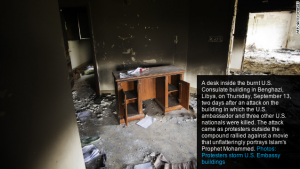The Quickie FBI Visit to Benghazi and the Arrests in Turkey
Two updates to the Benghazi attack story I’ve become obsessed with.
Multiple reports say the FBI has finally visited the attack site in Benghazi. The AP reports they were only onsite (the assumption being the sites include the consulate, the safe house, and presumably another safe house location) for about 12 hours.
Agents arrived in Benghazi before dawn on Thursday and departed after sunset, after weeks of waiting for access to the crime scene to investigate the Sept. 11 attack.
The agents and several dozen U.S. special operations forces were there for about 12 hours, said a senior Defense Department official who spoke anonymously because he was not authorized to speak publicly about the ongoing investigation. The FBI agents went to “all the relevant locations” in the city, FBI spokeswoman Kathy Wright said. The FBI would not say what, if anything, they found.
The FBI visit comes less than 24 hours after the WaPo visit on Wednesday when they discovered a bunch of documents.
More than three weeks after attacks in this city killed the U.S. ambassador to Libya and three other Americans, sensitive documents remained only loosely secured in the wreckage of the U.S. mission on Wednesday, offering visitors easy access to delicate information about American operations in Libya.
At first, I wondered whether this was a response to the WaPo’s apparent ease of access to the compound–that may have added urgency. But the AP story suggests that the FBI asked for military transport to Benghazi several days before the trip–so Tuesday at the latest.
Little said it was “a matter of days” between the request for the FBI to access the Benghazi crime scene and the team’s arrival Thursday, Libya time, when the U.S. military airlifted them to the city.

